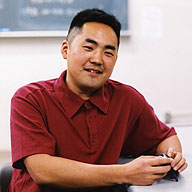An Interview with Ren Shujian
I Have Mixed Feelings When I’m Told It’s “Interesting”
Q: What led to your encounter with the family?
RS: I met the family’s fourth eldest son shortly after I came to Tokyo. Two years later I was making my graduation piece at the Japan Academy of Moving Images, and I remembered his family’s story when I was doing research about the issue of illegal residents. At first I really didn’t want to interact with them, and I was indignant about why they did bad things like that. And on their side, they didn’t want to let other people know about the conditions they were living in. But talking a lot without creating a good relationship meant I couldn’t really enter into their lives. As I helped with their work and lived with them, a more intimate, or familial atmosphere started to come out. Through interactions like those, a feeling of compassion toward them grew within me too.

Q: During the shooting stage, was there anything else you were aiming for?
RS: I wanted to carefully depict why they throw away their family ties and come to Japan. They want to work as hard as they can, save money and live happily with their families, and they don’t intend to do anything bad. But they can’t make it happen in China so they come to Japan and run smack into the wall of the law. They were always saying “there is no tomorrow for us.” They could be arrested any day, so they work as hard as they can. A lot of different incidents happened during the period when I was shooting. If they could live properly in China, they wouldn’t have come to Japan to work. It’s a sad thing as human beings.
Q: So why do they take those kinds of risks to come to Japan?
RS: Compared with the way things used to be, in reality it’s easy to find good jobs even in China. But Fujian Province where they live is known as the birthplace of overseas Chinese merchants, and when people around them go abroad to work they hear the money is good so everyone goes overseas. There are smugglers who act as go-betweens to give opportunities to people like that, and it even feels like a tradition. This comes out in the piece, but there’s the appeal that your family will be happy if you build them a palace with money you earn overseas. Usually people don’t do anything flashy like that. There are some things I don’t understand either.
Q: As an exchange student, you are in a very different position.
RS: It’s a really harsh reality that even though we’re all Chinese, we live completely different lives. Right now China is extremely vigorous and is developing economically, but the biggest problem is destruction of that balance. I think our generation’s efforts will definitely make things better, but the first priority is for China’s economy to catch up with Japan. I think the problem of illegal residents is fundamentally a problem with society and China’s well being.
When I presented this work several people praised it as being interesting, but I had mixed feelings. I didn’t intend to make an interesting piece. Why do they have to live like that, as people living in the same twenty-first century? I myself don’t really want people to know the bad things about the kind of country where my own countrymen go overseas because they can’t live in my own country. That being said, people have many different social faces, so first I’d like you to feel their humanity just as it is by seeing how they live at this moment in time.
(Compiled by Sato Hiroaki)
Interviewer: Sato Hiroaki
Photography: Kato Takanobu / Video: Kato Takanobu / 2003-10-06 / in Tokyo
